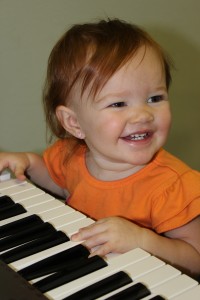Why have a music class for toddlers?
Whenever I tell people I meet that I am a music teacher, they assume at first that I teach beginners, ages 7 and up, and then they become more and more surprised to find out just how young my students are when they start.
“Three years old seems awfully young,” they often say.
Some will ask, “So what can a 3 year old even do in a music class?”
To answer that particular question, it takes a lot of time and usually leads to more questions, but don’t worry, I really enjoy sharing information about the three year old music course. I think more people should know about it. But to go even further, I also want everyone to know that you don’t have to wait until your child is 3 before you bring them to music class. In fact, music should be a part of every baby and toddler’s daily life. I don’t know of a daily music class for babies and toddlers, and our school does not offer one, but we do have a monthly class that we hope will give you some activities you can do with your child at home. So let’s talk about what goes on in a music class for toddlers and babies.
You might be wondering what can a baby or toddler possibly do in a music class? Well, a music class for toddlers and babies is full of fun engaging activities for both the parent and their toddler. We sing songs together, do motions with some of the songs, we move around the room to the music, we do dramatic play with the music, we listen to musical instruments, we play musical instruments, and we teach musical concepts. Yes, indeed, toddlers and babies can learn musical concepts. I bet you didn’t think that was possible.
Babies and toddlers are extremely sensitive to music, in many ways. They can hear musical characteristics easily and their bodies react to the music naturally. They react as they hear the music getting more exciting. They may want to jump up, dance, or giggle and laugh and fall down. They also calm down and may become sleepy as the music soothes them. Those are musical concepts. Music that’s getting more exciting may be getting louder, or faster, or more instruments join in playing the piece. Music that is soothing is smooth, with long notes and phrases, the tempo might be slower, or it might have a swaying feel with a 3/4 waltz meter. Those characteristics are just of few of many more that we can do in music class. The movements that we do with the music highlights those concepts so that the babies and toddlers are more engaged and react more to what they are hearing.
Of course, these little ones will not be articulating the ideas and are unaware, but because of the depth and complexity of what they are hearing and how they interacting with the music, it has such a strong impact on their brain. Engaging in musical activities create important connections in the brain that need to be created because they will be necessary later in life for doing things like math and reading. Here’s a link to more information about music and brain development.
I know, now you are super excited and want to know how you can attend a music class with your toddler and learn how to do these musical activities at home, right? We have music classes that start every quarter – you can come try one class out before you sign up. Click here to make a reservation.
There’s is still a lot more I’d like to share on the topic of music class for toddlers, so come back later for an entry about what kinds of activities you can do at home with your toddler.



Leave a Reply